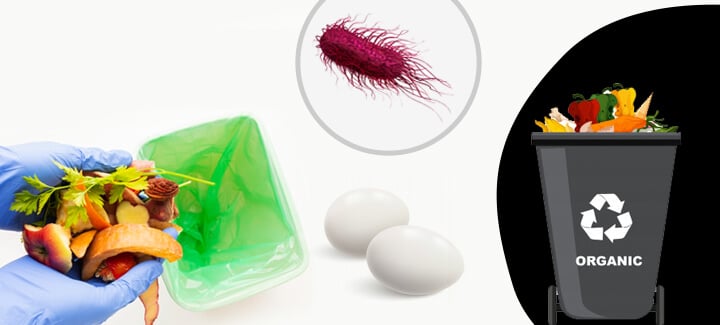
An egg is one of the most nutritious and delicious foods provided to us by nature. There are many types of eggs, from omega-3 to organic available in the market. Nowadays, there is also an influx of branded eggs that claim to have low cholesterol. These graded eggs are fortified with vitamins A, D, and E and assure the best quality.
Yet time and again, one question comes up “Can you get salmonella from eggs?” In a nutshell, it depends on the hygiene practices followed and how well you cook those eggs.
Yet, let’s learn more about the dangers of salmonella and how to prevent them.
A salmonella is a group of bacteria commonly found in raw meat and poultry items. Food poisoning from eggs is common in many regions and countries of the world. Even fresh eggs with clean and perfect shells may contain salmonella. Yet, a lot of people are unaware of how common salmonella is in eggs. So it is imperative to get food handlers training through a Courses and Certification Agency.
When taking a food certification course in Utah, you understand how one gets salmonella. Salmonella first affects the intestines and then spreads to other parts of the body. The symptoms appear within 6 to 48 hours after consumption of contaminated eggs.
Someone affected by salmonella will experience diarrhea, high fever, and abdominal cramps. Thankfully, most of the symptoms of salmonella subside within 4-5 days. Yet, people with a weak immune system may have a severe infection and may need hospitalization.
Hence one must follow safety precautions when handling eggs. FDA – Food & Drug Administration has set regulations to handle, store eggs and transport them to prevent contamination. Following are some safety tips and tricks one can follow to avoid getting a Salmonella infection-
Recommendation: Five common foodborne illnesses caused by improper food handling
One must buy eggs from grocery stores that follow egg storage safety regulations. Reputed vendors and grocery stores always store eggs in the refrigerator. Refrigeration prevents the bacteria from multiplying due to cold temperatures. Look for clean eggs, and the shells are not too thin, soiled, or cracked. It is best and safe to buy pasteurized eggs. Pasteurized eggs go through a process of heating and holding eggs at 140° F temperature at least. This process makes eggs salmonella-free and prevents contamination of eggs.
Proper storage of eggs affects both their quality and safety. It is best to store shelled eggs in the refrigerator at an ideal temperature of 40° F or below. The eggs remain fresher when stored in their original carton. Do not store eggs in the refrigerator doors as they are the warmest area of the refrigerator. Never wash eggs before storing them as it removes the protective mineral oil coating on them. Washing eggs before refrigeration increases the chances of bacteria entering the egg. For best quality, one should use eggs within three weeks from the day you refrigerate them.
If one wants to store eggs for a more extended time, then the best option is to freeze eggs. Do not freeze eggs in their shells. Instead, freeze the eggs by beating the yolk and white together and storing the same. Eggs and egg-based dishes taste best when consumed fresh. To store them, it is best to refrigerate them and consume them within 2 to 3 days.
Before commencing to cook eggs, one must follow proper hand hygiene, i.e., washing hands with soap and water. Besides, it is best to keep a separate scrubber to wash and clean utensils that you use for egg preparation. This will prevent the transfer of any leftover residue from the egg scrubber to other utensils.
One must fry, scramble and poach the eggs till both egg yolks and egg whites are firm. One can cook egg dishes at an internal temperature of 160°F or hotter. Use a food thermometer to check and to cook eggs at the right temperature. Prepare raw egg-based dishes like ice cream, salad dressings with pasteurized eggs. Pasteurized eggs have fewer chances of contamination.
Eggs change their taste and smell over time. It is best to serve and consume boiled eggs, fried eggs, and egg-based foods like quiches immediately. Never leave leftover eggs or egg-based preparations at room temperature. This allows the bacteria to multiply, making the eggs unsafe for consumption.
One can refrigerate the unconsumed eggs and egg dishes. Just ensure to reheat them at 165°F before serving. Serve reheated egg and egg dishes in small platters to maintain their temperature. Refrigerate all egg-based preparations till the time of serving. Keep the deserts that contain eggs on an ice base while serving.
For picnics and outdoor gatherings, pack the eggs and egg dishes in insulated coolers. This will keep the eggs at the right temperature. At picnic spots, one can put them in the shade and keep the lids of containers closed. This way, one can prevent eggs and egg dishes from getting contaminated and spoiled. If you carry eggs to school or workplace, pack cooked eggs with frozen gel packs or frozen juice boxes.
Eggs are the most common carriers of salmonella. Hence one must take care with eggs. Check the eggs for freshness and always ensure to store them in the correct temperatures. Follow safety tips while preparing and serving eggs to safeguard against salmonella. One should take care while handling eggs. In case of food poisoning due to eggs, one must seek medical advice immediately.